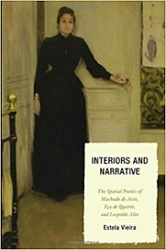Interiors and Narrative shows how crucial interiors are for our understanding of the nature of narrative. A growing cultural fascination with interior dwelling so prevalent in the late nineteenth century parallels an intensification of the rhetorical function interior architecture plays in the development of fiction. The existential dimension of dwelling becomes so intimately tied to the novelistic project that fiction surfaces as a way of inhabiting the world. This study illustrates this through a comparative reading of three realist masterpieces of the Luso-Hispanic nineteenth century: Machado de Assis’s Quincas Borba (1891), Eça de Queirós’s The Maias (1888), and Leopoldo Alas’s La Regenta (1884–1885). The first full-length study to juxtapose the renowned writers, Interiors and Narrative analyzes the authors’ spatial poetics while offering new readings of their work. The book explores the important links between interiors and narrative by explaining how rooms, furnishings, and homes function as metaphors for the writing of the narrative, reflecting on the complex relation between private dwellings and human interiority, and arguing that the interior design of rooms becomes a language that gives furnishings and decorative objects a narrative life of their own. The story of homes and furnishings in these narratives creates a semiotic language that both readers and characters rely on in order to make sense of fiction and reality.
Interiors and Narrative: The Spatial Politics of Machado de Assis, Eca de Queirós, and Leopoldo Alas
Interiors and Narrative: The Spatial Politics of Machado de Assis, Eca de Queirós, and Leopoldo Alas
- Estela Vieira
- Publication Date
2013 - Website
- Find out more
 The College of Arts
The College of Arts